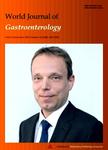Macrophage migration inhibitory factor stimulated by He/icobacter py/oriincreases proliferation of gastric epithelial cells
Macrophage migration inhibitory factor stimulated by He/icobacter py/oriincreases proliferation of gastric epithelial cells作者机构:Department of Medicine Institute of Molecular Biology Department of Molecular Microbiology
出 版 物:《World Journal of Gastroenterology》 (世界胃肠病学杂志(英文版))
年 卷 期:2005年第11卷第13期
页 面:1946-1950页
核心收录:
学科分类:1002[医学-临床医学] 1001[医学-基础医学(可授医学、理学学位)] 100101[医学-人体解剖与组织胚胎学] 100201[医学-内科学(含:心血管病、血液病、呼吸系病、消化系病、内分泌与代谢病、肾病、风湿病、传染病)] 10[医学]
基 金:Supported by a Competitive Earmarked Research Grant from the Research Grants Council of Hong Kong Special Administrative Region China HKU7318/01M
摘 要:AIM: Helicobacter pylori (H pylori) is associated with increased gastric inflammatory and epithelial expression of macrophage migration inhibitory factor (MIF) and gastric epithelial cell proliferation. This study aimed at determining whether H pylori directly stimulates release of MIF in monocytes, whether the cag pathogenicity island (PAI) is involved for this function, and whether MIF stimulated by H pylori increases gastric epithelial cell proliferation in vitro. METHODS: A cytotoxic wild-type H pylori strain (TN2), its three isogenic mutants (TN2Δcag,TN2ΔcagA and TN2ΔcagE) were co-cultured with cells of a human monocyte cell line, THP-1, for 24 h at different organism/ cell ratios. MIF in the supernatants was measured by an ELISA. Cells of a human gastric cancer cell line, MKN45, were then co-cultured with the supernatants, with and without monoclonal anti-MIF antibody for 24 h. The cells were further incubated for 12 h after addition of 3H-thymidine, and the levels of incorporation of 3H-thymidine were measured with a liquid scintillation counter. RESULTS: The wild-type strain and the isogenic mutants, TN2ΔcagA and TN2ΔcagE, increased MIF release at organism/cell ratios of 200/1 and 400/1, but not at the ratios of 50/1 and 100/1. However, the mutant TN2Δcag did not increase the release of MIF at any of the four ratios. 3H-thymidine readings for MKN-45 cells were significantly increased with supernatants derived from the wild-type strain and the mutants TN2ΔcagA and TN2ΔcagE, but not from the mutant TN2Δcag. Moreover, in the presence of monoclonal anti-MIF antibody, the stimulatory effects of the wild-type strain on cell proliferation disappeared. CONCLUSION: H pylori stimulates MIF release in monocytes, likely through its cag PAI, but not related to cagA or cagE. H pylori-stimulated monocyte culture supernatant increases gastric cell proliferation, which is blocked by anti-MIF antibody, suggesting that MIF plays an important role in H pylori-induced gastric ep



